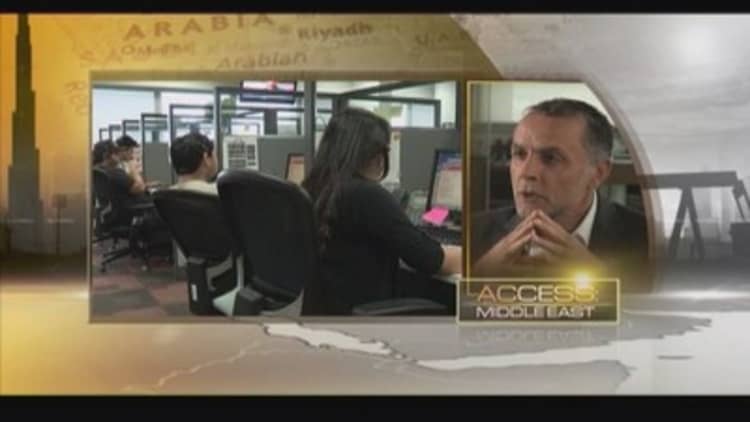The founders of Instagram might never have guessed they were helping to spur an entrepreneurial revolution among Saudi women.
"I'll let you in on a secret," said Deem Al Bassam, 28. "You use Instagram to share photos, right? We are here (at home), using it as an e-commerce platform. You cannot imagine the number of businesses that are growing on Instagram."
Deem's sister, Rand Al Bassam, saw $10,000 worth of email orders for her turbans in one month after she launched on Instagram. She's since established an e-commerce platform for T4Turban.
The entrepreneurial siblings from Saudi Arabia—Deem owns a high-profile restaurant in Dubai called Switch—are part of a surprising trend: the growing number of women-owned businesses in the Middle East, a region that has long had one of the lowest rates of women's entrepreneurship. The trend is by no means uniform, and in some countries it is hampered by restrictive laws and cultural practices that make it hard for women to act independently.
(Read more: The world's hot start-ups)
But women all over the Middle East are finding ways to start businesses that range from bakery stalls in bazaars to small manufacturing operations to venture capital–backed e-commerce companies. Technology from social media to crowdfunding is helping to spur the change. The women involved see themselves at the vanguard of a movement that is about more than economics.
"It's all about empowerment," said Mona Ataya, CEO of Dubai-based Mumzworld, a baby retailer that sells more than 100,000 products. Not only does the 40-employee website put information and purchasing power into the hands of women, Ataya serves as an example herself. "I would love to one day be able to have a grand exit and have Amazon purchase my company so that other women who have not had the initial courage to start a business would see. There is a trickle effect. A few women start, and more carry on."
Already, Ataya is a model for other women. Revenue for her site is growing at a rate of 50 percent, quarter over quarter. Though she would not disclose revenues, she said the average basket size is $135.
(Read more: Young, confident and leading)
Beneath the abaya
There is a connection between what they were asking for in Tahrir Square and entrepreneurship, because they come from the same place.Christopher SchroederAuthor of "Startup Rising"
Women run only one of every four start-ups overall in the region that includes the Middle East, according to the "Global Entrepreneurship Monitor's 2012 Women's Report," Numbers are hard to come by, but in the six countries for which the best data is available —Algeria, Egypt, Iran, Palestine, Tunisia and Israel—there were about 9.9 million new ventures in total, so about 2.5 million new ventures of all kinds and in all industries could be run by women.
The tech scene is drawing the most attention now. Much of the surge has come about in the years since the Arab Spring. "There is a connection between what they were asking for in Tahrir Square and entrepreneurship, because they come from the same place," said Christopher Schroeder, author of "Startup Rising," about start-ups in the Middle East. "Tools of technology that allow people to express their voice politically, societally, culturally—why wouldn't they unleash desire for an economic voice as well?"
The women entrepreneurs don't see political tensions as a detriment but rather as an opportunity. "Problems come with opportunity," said May Habib, founder and CEO of Qordoba, a translation site based in the UAE. "If you're someone who is a natural hustler, you can make money."
At start-up competitions and in funding pools, a third or more of the entrepreneurs often are women. At the MIT Enterprise Forum Arab Startup Competition, 48 percent of the 4,500 teams included women, according to statistics cited in "Startup Rising."
Schroeder, an Internet entrepreneur who is one of the nascent community's American supporters, started to notice the increasing entrepreneurial energy in the Middle East in 2010. Many of the encounters that convinced him to change his view of entrepreneurship in the Middle East were with women.
(Read more: The world's start-up hot spots)
"She sat beside me, shoulders proudly back, in the head-to-toe abaya that revealed only her face and hands," he recounted on his book's first pages. He offered general platitudes and then found himself being grilled by the woman, who needed specific advice about low-cost manufacturers in China to help her fill 1,000 pre-standing orders. "This was not the Middle East I had been taught to expect," he said.
Social media and the new crowdfunding platforms are helping to drive the change by connecting women with their markets and by filling in traditional gaps in financing, both for start-ups and microenterprises. Instagram said it does not provide data on its use in different regions. Other companies do: San Francisco-based Kiva.org, for instance, has loaned money to 7,000 women entrepreneurs in the Middle East since the beginning of 2011, for a total of $9 million.
Some of the new women-owned businesses are pushing boundaries in many ways. Amourah, a woman-owned business based in Dubai, is on a mission to "get every woman in the Middle East a perfectly fitted bra."
Another company, Qordoba, provides translation services for more than 50 languages, much of it for companies, and provides work for more than 1,000 writers, editors and translators, many of them women. It has just raised a $1.5 million A round, which it is using to open an office in Munich to add to its four in the Middle East. Ataya's Mumzworld, which is three years-old, is in the midst of raising a $5 million B round.
The power of the X factor

A serial entrepreneur who was one of the co-founders of recruiting site Bayt.com, Ataya makes a clear business case for Mumzworld, the first mover and still the largest player in its vertical. Even more compelling is the size of its market: Women in the Middle East control $350 million of the region's vast wealth, and they are not shy about spending on fashion and luxury for their families; the average spend of the mother in the Middle East is three times that of European women, according to Ataya.
Ataya spoke over gentle thumps that were the sound of her 6-year-old playing football nearby (her 10-year-old twins were playing tennis outside). Like women entrepreneurs everywhere, women in the Middle East face the challenges of playing company boss one minute and caregiver the next—routinely toggling from tough to sweet. In addition, they sometimes face overt sexism, though they go to pains to de-emphasize it in conversation. "It is not really there unless you believe it," said Al Bassam.
(Read more: Luxury Tampons? Marketers go glam)
Hind Hobeika is a 25-year-old entrepreneur preparing to ship next month (December) 1,000 pre-ordered Instabeat devices for swim goggles, which measure swimmers' heart rates. She started her Beirut-based business in 2011 after winning third prize in a business plan competition. She also raised more than $50,000 on international crowdfunding platform Indiegogo. Funding in hand, she was looking to rent office space.
"Have you been to school yet today?" a landlord taunted.
Infuriated, she bargained him down from $1,000 to $700 for the monthly rent—and then walked away. "I didn't even want the space," she recalled. "I just wanted to piss him off."
This kind of encounter is of small concern to Hobeika, who is working 12- to 14-hour days and considering which big brand she wants to help her distribute Instabeats.
Both Hobeika and Al Bassam, the entrepreneur from Saudia Arabia, see entrepreneurship as a vehicle to a self-determined work life. After Instabeats hit the market, Hobeika plans to develop other devices to help athletes. Al Bassam is involved in another start-up, a design firm, and plans to open more Switch restaurants. "This is who I am," she said. "It really defines me as Deem. It gives me the life I want."
—Elizabeth MacBride, Special to CNBC.com





